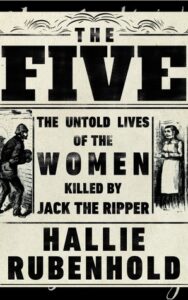 The Five, Hallie Rubenhold
The Five, Hallie Rubenhold
I didn’t really expect to find this riveting; it really isn’t my period of interest whatsoever, and I’m not hugely into murder stories. But, after all, this isn’t about the Ripper, but about his victims, and Rubenhold brings sympathy and painstaking research to the task. I’ll admit I haven’t fact-checked her on anything (given that it isn’t my period), but assuming she’s done the work — and the bibliography certainly suggests that she did — then it’s a wonderful window into the lives of five women who are only remembered because of their brutal murders, whose real lives and attributes were eclipsed by gossip and sensationalism.
That said, I have a serious issue with the way Rubenhold frames all this. Her urgent mission throughout — restated countless times — is to assert that almost none of the five victims of the Ripper were actually prostitutes. She states again and again that they weren’t prostitutes, that we’ve eclipsed their real lives and motives and struggles in our remembrance of them as such. Which is fair enough; the correction of the record by sketching out their actual lives is a welcome one. But, I got the strong impression that Rubenhold feels that the women are worthy of more attention because they weren’t prostitutes (apart from Mary Jane Kelly, who clearly was, and who gets perhaps the least attention in the book; not coincidentally, perhaps).
And that’s bullshit. If they’re worthy of understanding and remembering, it’s as whole people, and that would be true whether they slept with no one or half the population of London. They’re not more important because they weren’t prostitutes, and Mary Jane Kelly isn’t less important because she was. They were people, and no one has any right to murder anyone regardless of how they earn their money.
For the most part, Rubenhold is sympathetic to the plight of the women, noting where things went wrong for them and points where things may have turned around. (I’ll note again that she did not do the same for Mary Jane Kelly, who was actually a prostitute.) She details their everyday lives with pity and care, and she writes well. But I’m left just a little bit uncomfortable about that constant implication that it matters whether they were prostitutes. At the time, it did, because it shaped their whole lives, and their deaths as well, and because it may well have mattered to them. I can understand rehabilitating them for that reason.
But even if every single one of the five was a prostitute, they should still be interesting to us now for the exact same reasons as they are interesting to Rubenhold. It speaks poorly of her if she thinks that sex workers are automatically less interesting than everyone else, and that is very much the impression I got.

I think this is the first review I’ve seen that criticizes this book. Everyone just raves about it. I’m glad you mostly liked it! I love that time period, so I’m going to read this book for sure.
Aj @ Read All The Things! recently posted…The Sunday Post #213
It’s really quite enjoyable — honestly, the thing about her attitudes to sex workers is probably my only criticism!